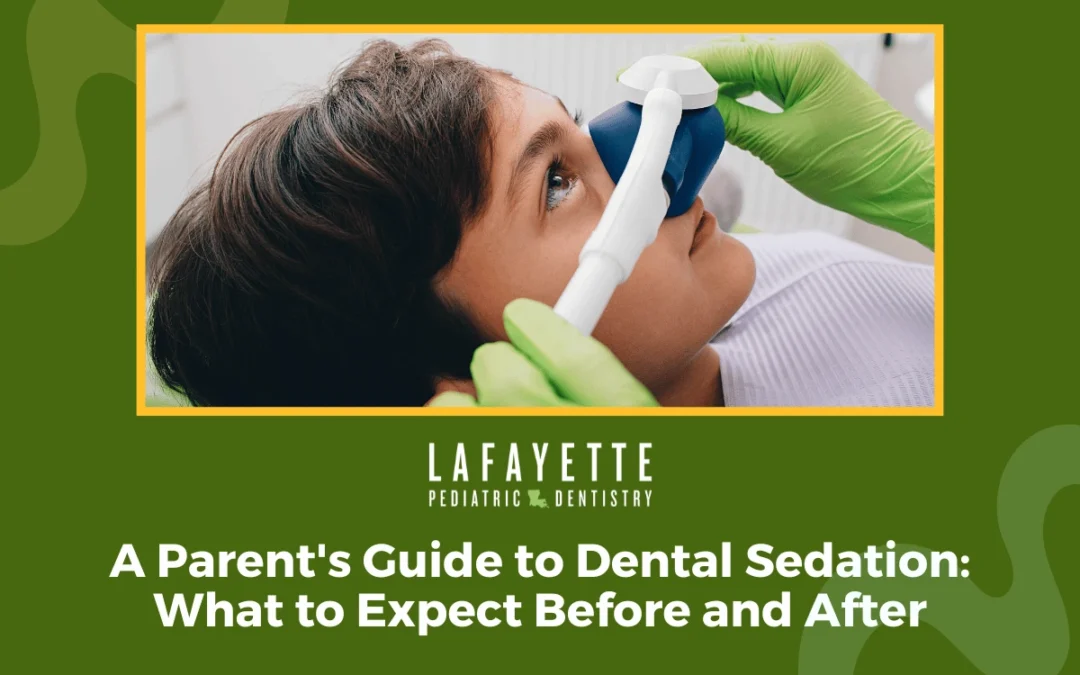The words “dental sedation” can make any parent’s heart skip a beat. But sedation is actually really common in pediatric dentistry, especially for young kids, anxious children, and kids with special needs.
Sometimes, it’s truly the best option for your child, even though it might feel a little scary.
We understand that the idea of your little one being sedated can feel overwhelming, but dental sedation allows us to provide necessary care while keeping your child comfortable and stress-free.
For many children, it can mean the difference between getting the treatment they need and having a traumatic experience that could affect their relationship with dental care for years to come.
What to Expect Before the Dental Sedation Procedure
Before the appointment, there are a few things you can do that will help the process go more smoothly for both you and your child.
Follow the Fasting Instructions
Your child’s dentist will give you specific instructions about eating and drinking before the procedure, and these instructions must be followed exactly.
Usually, this means no food or drink for a certain number of hours before the appointment. We know it’s tough when your kiddo is asking for their favorite snack, but these guidelines are in place for their safety.
Stay Calm
Something we notice frequently is that parents are understandably nervous, and kids are like little emotional sponges. They pick up on your anxiety. We totally understand that this experience can make you nervous.
It honestly would be unusual if you weren’t at least a little worried. But try your best to stay calm in front of your child. Take some deep breaths and focus on staying positive. Most importantly, remember that the whole process will benefit your child in the long run.
Use Positive Language in the Days Leading Up
For some kids, just the thought of going to the dentist is stressful enough, so the days leading up to the appointment matter. Use positive encouragement and avoid saying things like “don’t worry” or “it won’t hurt.”
Kids hear the worry and hurt part more than anything else. Instead, talk about how the dentist is going to help their teeth feel better.
Bring Comfort Items and Consider Educational Videos
If your child has a comfort item like a stuffed animal, blanket, or special toy, bring it along. These familiar objects can work wonders for reducing anxiety. You might also consider showing them videos about going to the dentist, just like you would for any regular dental appointment.
There are some great kid-friendly videos out there that explain dental visits in a non-scary way, such as this Sesame Street episode.
Read more: Here’s What to Do If Your Child Has Dental Anxiety
Limit the Number of People Coming to the Appointment
While we don’t usually prohibit siblings from coming to regular dental appointments (and sometimes it’s actually good for them to see what happens), we recommend keeping the group small during sedation procedures.
Too many people can be distracting, and we want to keep things as calm as possible. However, having a second adult there is often helpful.
What to Expect After Dental Sedation
Here are some of the things you can expect once your child’s procedure is finished.
Normal Side Effects Your Child May Experience
Once the procedure is done, your dentist will walk you through what to expect based on the type of sedation your child received. Side effects from dental sedation are usually minimal and wear off after a few hours.
The most common things you’ll see are grogginess, some nausea, and lack of physical coordination. Your child might seem like they’re waking up from a really deep nap. They might be a bit wobbly on their feet or seem “out of it” for a little while. Some kids also get a temporary sore throat, which is totally normal and usually nothing to worry about.
Plan for a Recovery Day at Home
We usually recommend taking the day off school and limiting activities after the procedure. Your child’s body needs time to recover, and you’ll want to be there to monitor how they’re feeling.
Keep activities low-key. Maybe some quiet time with books or movies, but skip the playground or bike riding until they’re back to their normal selves.
Most kids bounce back pretty quickly, but every child is different. Some might sleep for a few hours, others might be up and asking for snacks within an hour. Both are normal.
Signs That Require a Call to Your Dentist
If you notice prolonged side effects like fever, persistent vomiting, or anything else that seems concerning, call your dentist immediately. It’s always better to check in than sit at home wondering if something might be wrong.
Read also: Debunking the Myths About Sedation Dentistry for Children
We know this isn’t the easiest experience for any family, but dental sedation allows us to provide the care your child needs while keeping them comfortable and safe.
Our Lafayette pediatric dental office offers a range of sedation options, including nitrous oxide (giggle gas) and conscious sedation, to make sure your child gets the best possible care in the most comfortable way possible.
Every child is different, and we work with you to determine what’s going to work best for your kiddo. Give us a call to learn more about our pediatric dental sedation options, or you can fill out our form to request an appointment.
Our pediatric dental specialists are here to answer any questions you have and help make this experience as smooth as possible for both you and your child.
